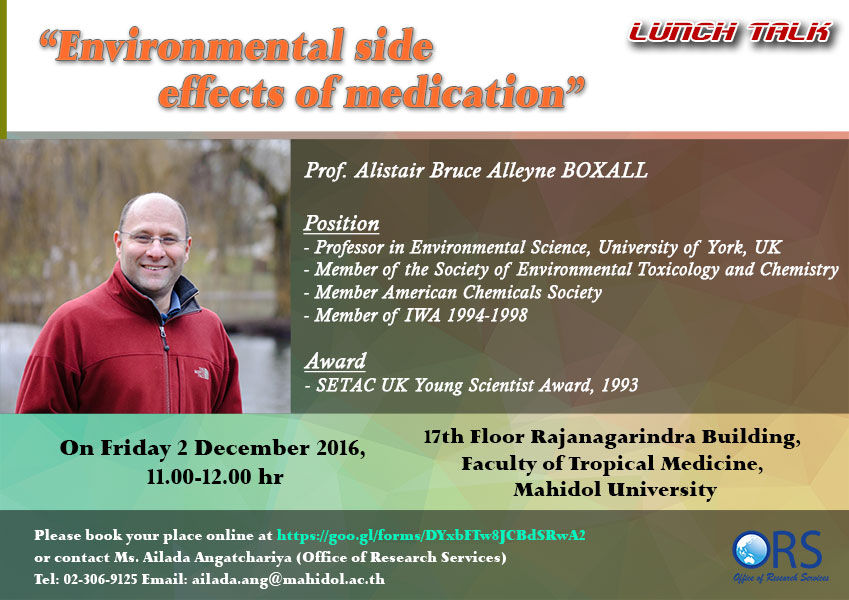On December 2, 2016 at 11.00-12.00 hr.

Environmental Side Effects of Medication
To provide an insight into the plight of our environment, Prof. Allistair Boxall from University of York presented his study “Environmental Side Effects of Medication” on 2nd of December 2016.
Prof. Boxall started the talk with slides that showed the locations in the UK where most of the research conducted. He also showed images and facts about his university, University of York as well the city of York.
He mentioned early studies that had taken place in Germany in the 1990s and the US in 2002 (140 rivers) then discussed the disposal of human and veterinary pharmaceuticals has affecting rivers in the UK. Various chemicals have been detected in these rivers and other surface water, and what is most alarming is that some are becoming the effect on the ecology and human health whereby some pharmaceuticals are infused with drinking water. This occurs mainly because sewerage systems do not facilitate microbial degradation due to resistance, and improper disposal of pharmaceuticals.
In their monitoring results, they detected pharmaceuticals in drinking waters such as; metformin, nicotine, acetaminophen, carbamazepine, cotinine, and triamterene.
Other than that, a significant contributor to pharmaceutical use is approx 290 tonnes of antibiotics are used in veterinary medicine each year in the UK which affected agricultural waters, and drugs such as fluoxetine caused changes to animal behaviour such as fish reproduction and bird species such as vultures, decreased, both due to their highly sensitive receptors. Prof. Boxall displayed statistics, facts, and test results that support the study.
With regard to the effects on human health, according to Prof. Boxall the majority of medicines we use are unlikely to be have an impact, and the risk to human health is low in Europe/N. America. But there is evidence that a handful of substances could be impacting Eco-systems. There is increasing evidence of effects on wildlife such as birds and bats.
Prof. Boxall investigated the Risk Characterization Ratio to human health. Up to 45.5% of modelled river reaches in England and Wales have concerning concentrations of ibuprofen. Antibiotics may be impacting primary production and significant proportion of rivers have concerning levels of estrogen.
Despite this startling study, we can still reduce pharmaceutical impacts by upgrading sewage treatment plants, changing the way we use drugs, introducing stewardship schemes, and introducing nonthreatening substances that are “benign by design”.
In the final part of his talk, he referred to the underused free pharmaceutical disposal service offered by all UK pharmacists and presented Pyropure, an on-site system for hazardous waste treatment. This machine will effectively dispose of pharmaceuticals with greater than 99% destruction of all pharmaceuticals achieved in all waste simulations.
We thank Prof. Boxall for his interesting yet mind-opening talk and look forward to hearing more about his researches in the future.